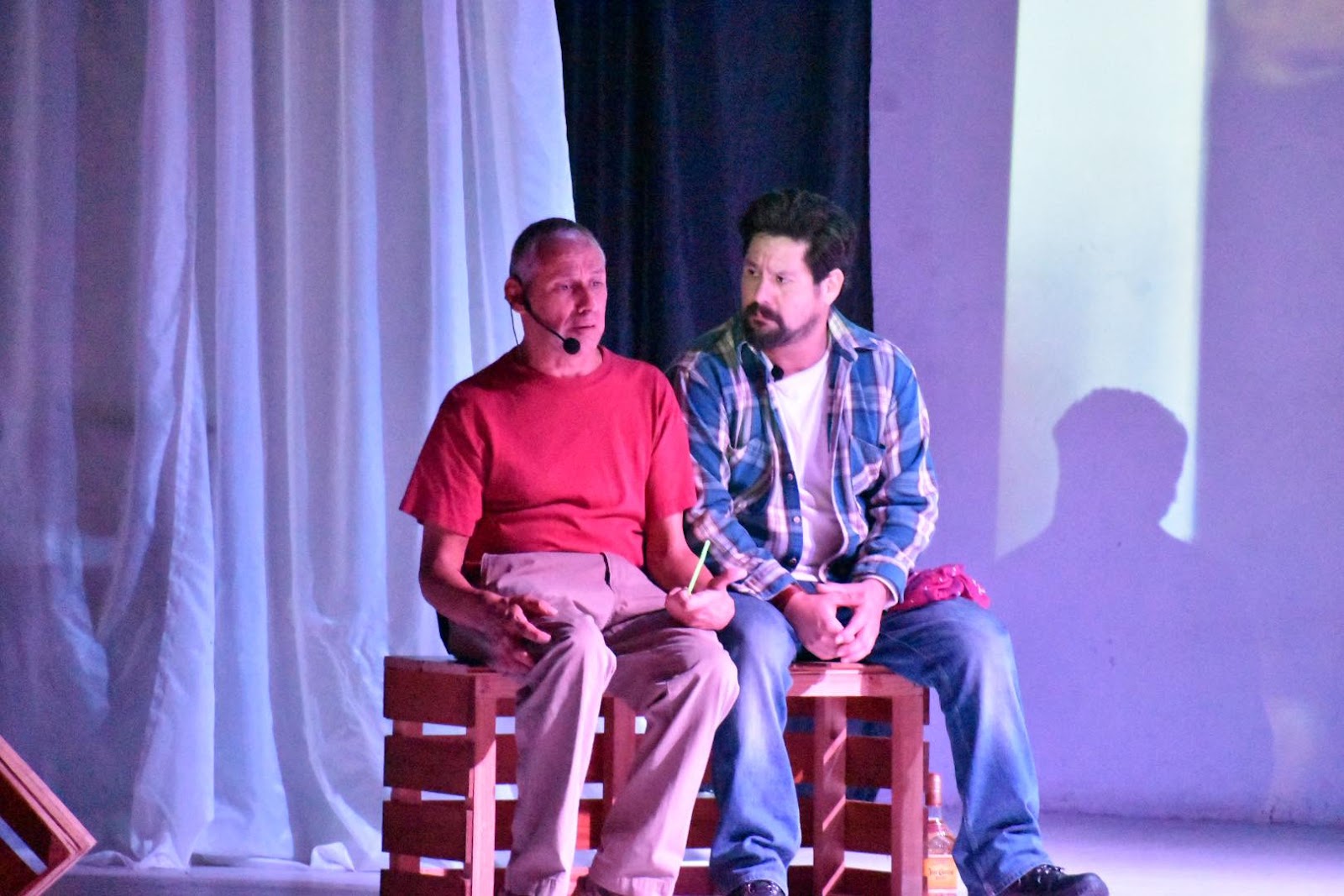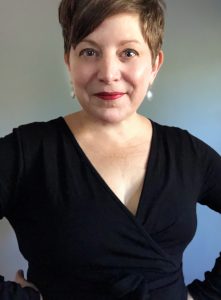Samuel Valdez and Paul Araujo in AND HE BECAME A MAN presented at Cine Libertad in Tijuana, Mex. Nov. 8th 2019. Photo by Bryant Hernande.
November 2021 | Shannon Ivey
According to the United States Centers for Disease Control and Prevention (CDC), 26% (1 in 4) of adults in the US have some type of disability. The southeast USA (the service region of Alternate ROOTS) has the highest percentage of people living with disabilities.
I’ve spent the majority of my theatre career in the southeast. In my experience, disability has meant an audience focus: ensuring folks can enter and exit the house space safely. When I attended the panel “The Real Meaning of Disability in Theatre” at ROOTS Week 2021, I experienced a new awareness, and I had a lot of questions.
The panel took place on August 6, 2021 and was advertised as a “long overdue discourse” on the subjects of Disability Rights, Disability Justice, Disability Theater, Aesthetics, Accessibility, Segregation, and Inclusion. Samuel Valdez moderated the discussion with invited guests Claudia Alick, Taja Will, Sean Fanning, O Mae Duchess Davis, and Clay Martin. These deaf and disabled artists have worked separately for years dealing with variations of these issues without having any communal support. In this conversation they came together to share thoughts through talking, planning, creating, and connecting in order to continue their artistic practice while supporting each other. Honestly, I didn’t know if I was disabled “enough” to be a part of this conversation.
One of the panelists, Taja Will, spoke about her own concerns in an article on Disability for American Theatre: “My first question when invited to do this panel was: Am I right for the panel? Am I enough? Do I know enough, as someone who lives with a chronic illness? Is that enough? Does it qualify me?”
To address these and other questions, I reached out to Samuel Valdez and Claudia Alick for a post-panel chat.
Shannon: 1 in 4 adults living with a disability in the US is a shocking statistic. Why don’t more theatre folks talk about this?
Samuel: Some disabled persons don’t know if they are disabled enough to identify as a disabled artist.
Claudia: People who are members of marginalized communities will react against being identified as part of that marginalized community because they’re trying to be identified with the dominant culture. I identify through my marginalized identity for political reasons. I do it so I can counter the narrative that people who share my identity are not already excellent.
Samuel: I agree with you, Claudia. So, first of all, I’m an artist. I identify as a Latino disabled artist for political reasons. In California, we have more freedom at the table as disabled people to be accepted into society. When I went to the south and saw the nonacceptance into society, I was like, WOAH what is going on? I think that the work we are doing as true disabled artists within Alternate ROOTS is a very big thing. We need to really define what it means to be a disabled artist on Southern Soil.
Claudia: I like organic metaphors to describe relationships and frameworks. Organic frameworks, because they are literally organic, means that they tend to result in more humane outputs. I try to use exclusively organic frameworks when I’m describing my processes instead of mechanistic frameworks. So, the organization is never a battleship. Yeah, it takes a battleship a long time to turn, but it also takes several seasons to fix soil that’s been poisoned.
Shannon: There is a common myth that identification as disabled takes a diagnosis or doctor approval. I hadn’t considered it to be self identification.
Claudia: If you convince most of the disabled people that they’re not actually disabled, then they will see people doing all the disabling things, and they will not stop it because that’s not their lane, that’s not their community, that’s not their fight. How do you convince a bunch of people to fight against their self interests? Convince them that they’re not the thing that they are. Convince them that identifying as the thing that they are will somehow not only hurt and harm them, but will somehow be hurtful and harmful to the broader community.
Shannon: What are some creative initiatives you are excited about because they engage artists with disabilities?
Claudia: Crip Tech incubator. We’ve created five residences for disabled artists to connect with scientists and technical artists to create beautiful work at the intersection of Disability Justice and accessibility. I’m excited about Unsettling Dramaturgy and their Sites Unsettled Project publication, which is an accessible digital publication. The National Disability Theatre’s 30 Days of Justice is a digital collaborative asynchronous exploration of racial and disabled justice for meaning making and community building.
Samuel: I’m excited to be working with National Disability Theatre to help them hire a managing Director for the organization. National Disability Theatre has been involved in producing a show before the pandemic with La Joya Playhouse that was totally run by disabled artists in all aspects of the production. The organization is growing and establishing working collaborations with national theatres on how to be more accessible and inclusive with their artists, their designers, and their audience. I also really appreciate the work of Sins Invalid, TL Lewis and Speak Out Now, and Calling Up Justice.
Author Bio:
Shannon Ivey MFA, AEA, is the founder of the award winning #whatshesaidproject. Ms. Ivey, from Memphis, TN, is a podcast host, professional actor, director, Tedx speaker, certified coach, story worker and creative disruptor. She holds a BA in Theatre from Mississippi University for Women, and an MFA in Acting from UNC Greensboro. http://www.whatshesaidproject.com
Panelist Bios:
Claudia Alick is a performer, producer, writer, and inclusion expert. Alick has served as the founding Artistic Director of Smokin’ Word Productions, is a NY Neofuturist alum, and the Oakland Poetry Slam Team. She is former Community Producer at the Oregon Shakespeare Festival where she produced events such “The Green Show”, The Daedalus Project, and producing/directing audio-plays such as the Grammy nominated “Hamlet”. She manages content with The Crew Revolution black female leadership, serves as Co-president of the board of Network of Ensemble Theater, and the board of NW Arts Streaming Hub, collaborates with the Unsettling Dramaturgy (crip and indigenous international digital colloquium) and Howlround advisory council. Claudia serves as founding executive producer of the transmedia social justice company CALLING UP. She is producing performances of justice on stage, online, and in real life.
Samuel Valdez graduated from San Diego State University in 1991 with a B.A. degree in theater arts. He is an actor, playwright, director, and producer who has worked with several groups around San Diego such as Sledgehammer Theater, Chronos Theater, Los Amigos del Rep., and currently his own performing arts bi-national company CARPA San Diego. He has served on the National Performance Network (NPN) board, is currently on the Alternate Roots Executive Community, and National Disability Theatre board. In 2016 he received the Ashley Walker Social Justice award by the City of San Diego for his community theater work. Find Samuel online:


